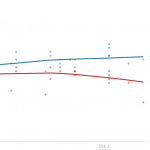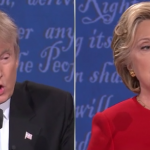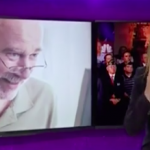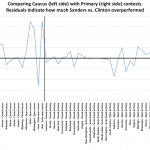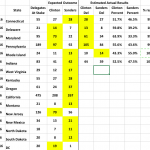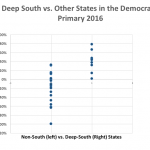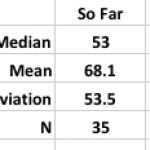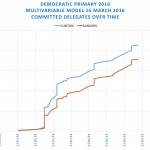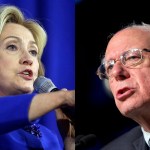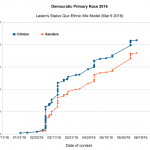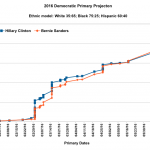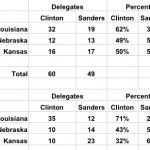clinton
You can't say who really won the debate, because on Friday, news broke, confirming other news from the prior Monday (and general suspicians) indicating that Donald Trump is not fit to be President in Yet Another Way, and his campaign essentially imploded. So, instead, we'll ask, "who won the weekend?"
As you know, I'm the last person to write off Donald Trump. From the very beginning, without fail, I've been warning you that he'll do well, that he'll win the GOP debates, that he'll win various primaries, that he'll win the nomination, etc. All of it. I have never once been wrong about this…
It was a tossup, but in a rather complicated way.
Even the regular commenters with major network news, and PBS, clearly indicated that Hillary Clinton won this debate. And she did. She not only had better answers, but actual answers. Trump acted very poorly and Clinton acted presidential. Trump got caught in several lies, and made several more lies that were to be caught later. He made a fool of himself and Clinton did very well.
Therefore, it was a tossup. It was a tossup because a couple percent of the populous are former Bernie Sanders supporters with so much butt hurt that they will not…
This is it. Don't mess this up.
It isn't that common that a single event can have a cascading effect on so many things. And if it does, such an event would not be that likely to have an entirely negative effect on all it touches. But, the election of Donald Trump as President of the United States would be such an event.
Therefore, in turn and in opposition, your vote this November 8th matters as much as his presidency would matter. So, you must vote. (And please remember to NOT VOTE FOR TRUMP. That's the point. Do not vote for Trump.)
Also please, make sure that if you intend to vote for a…
Following up on one of the issues addressed in "How The Press Created FrankenTrump and Ruined Civilization", we have this:
ScienceDebate.org is an organization that, for years now, has been pushing to get the candidates running for President of the United States to engage in a debate over science policy, just as they debate foreign policy, or economic policy, etc.
And, ScienceDebate.org has had some success. Some of the candidates, at the primary level, have engaged in such a debate, and at the national level, some of the candidates have contributed written answers to citizen-generated questions about science policy.
And now, they've done it again.
The four main candidates (two actual main candidates and two…
This is an excellent moment to revel in the complexity of life, and argument, and to appreciate the value of the honest conversation.
A candidate is the presumed nominee when she or he obtains the required number of pledged delegates to be at 50% plus a fraction in the total pledged delegate count. This is because a candidate must have a true majority to win the nomination when the delegates are all counted up at the convention, and the pledged delegates are required to cast their lot with the candidate they are pledged to, assuming that candidate exists at the time of the convention.…
As you know, I’ve been running a model to predict the outcomes of upcoming Democratic Primary contests. The model has change over time, as described below, but has always been pretty accurate. Here, I present the final, last, ultimate version of the model, covering the final contests coming up in June.
Why predict primaries and caucuses?
Predicting primaries and caucuses is annoying to some people. Why not just let people vote? Polls predict primaries and caucuses, and people get annoyed at polls.
But there are good reasons to make these predictions. Campaign managers might want to have…
As Rachel points out, the first one is pretty conventional. The second one is a killer. Have a look:
I'll combine my post predicting the outcome of today's Democratic Primary in West Virginia, and my post giving and discussing the results, here.
My prediction is on this table, on the left side of the line, and the actual results on the right side, for the last several primaries.
Every state is special, and some are more special than others. West Virginia has 29 pledged delegates, but not all of them were assigned today. I assume they will be assigned later. Thus, the slight difference in numbers between what I predicted and what happened.
A key message here is this. Clinton and Sanders…
Donald Trump is now the presumed Republican candidate for President of the United States. Prior to Cruz and Kasich dropping out of the race, it was not 100% clear that Trump would achieve enough delegates to "lock" the convention, but he was vey close. I am not sure if Trump will be the only candidate on the ballot for the remaining GOP primaries. Had Cruz and Kasich remained in the race, my estimate was that Trump would be about six delegates short of a lock, but even if those candidates are still listed on some future ballots, it seems likely now that Trump will win enough delegates to go…
This is a guest posts by Claire Cohen Cortright.
Claire Cohen Cortright is a mother, climate activist, and biology teacher living in upstate New York. She
is an active member of Citizens Climate Lobby and moderator at Global Warming Fact of the Day.
______________________________________________
It is time, now, for climate activists to get vocal.
As it becomes more clear that Hillary Clinton will be the Democratic Party’s nominee for President, there is increasing talk about the importance of unifying the party. Negotiations are on the horizon … for Vice President and for the Party’s…
How does the "southernness" of a state affect the Democratic Primary?
Clinton has been doing well in "The South." Of course, defining what "The South" is is pretty tricky. I divided up the states by "Deep South" vs. Other, so all the usual orginal deep south states count as "southern" except Florida. You know what they say about Florida. "The farther south you go, the farther north you get." Also, Texas is not deep south in the traditional sense.
Using this rough division, Clinton wins all the time in the "Deep South" and Sanders wins some and loses some in the other states, as shown in…
When either candidate wins a state, that candidate's supporters celebrate and underscore the significance of that win. The other candidate's supporters generally proceed to explain how it was not a significant win, or in some cases, come up with conspiracy theories about how the election was stolen.
So, here is an interesting question: Does one candidate or another, between Hillary Clinton and Bernie Sanders, tend to win bigger states more, or smaller states more? This is important because next Tuesday is the New York Primary, and New York is huge. Of course, state size is not the only…
There is some discussion about Bernie Sanders' strategy for winning the nomination despite being significantly behind in the pledged delegate count. Most of this discussion is nearly worthless because those engaged in it (talking and listening) are, or seem, poorly informed about how the system actually works. So I thought this would be a good time to look at some of the numbers.
First, some context.
The primary process is not Constitutionally democratic. There is no legal requirement that a party nominate someone based on any sort of voting process. But, over the last several decades this…
A new poll (March 24th) by Monmouth University says, "Among Democrats who support Bernie Sanders for their party’s nomination, 78% say they would vote for Clinton over Trump in November, while 12% would actually vote for Trump and 7% would not vote at all."
The Republicans have a similar problem, where "two-thirds (68%) of voters who back Ted Cruz for the GOP nomination say they would vote for Trump in November, while 13% would vote for Clinton and 10% would not vote. Among Republicans who back John Kasich, just 50% would vote for Trump and 19% would vote for Clinton, with 22% saying they…
I'm starting this post before any primary results are in, and I'll add the outcome of the primaries below, where I will also compare the results to my predictions and discuss what I think this means for the overall process of the Democratic primaries. But first, I wanted to get some thoughts down to contextualize my thinking on this. I'll publish this post now, at mid-day Tuesday, so look for an update late Tuesday night, or early Wednesday.
I like Hillary Clinton, and I often think that her presidency would be better than a Sanders presidency, with an inaugural in 2017. This is based on…
Most polls and FiveThirtyEight predict a Clinton blow-out on Tuesday, with her winning all five states, in some cases by a large margin. My model, however, predicts that each candidate will win a subset of these states, but with Clinton still win the day.
I’ve been working on a model to predict primary outcomes for the Democratic selection process, and generally, the model has proved very effective. After each set of primaries I’ve adjusted the model to try to do a better job of predicting the upcoming contests. The most important adjustment is the one that affects the current model.
The…
I have been presenting various versions of a model to predict the outcome of upcoming Democratic primaries. The earlier version of the model worked like this: Make some assumptions about the ratio of voting preference (for Sanders vs. Clinton) among the different major ethnic groups, and using the known distribution of said ethnic groups, predict the future.
I started out with the assumption that among whites, the ratio would be 50:50, based on one datum, the outcome from Iowa, which is essentially a white state. I used a bias for African Americans and Hispanic voters favoring Clinton.…
I developed a predictive model for the Democratic primaries that was designed to have the following features:
1) It does not rely on polling;
2) It does use exit polling and other information to set certain parameters;
3) It mainly uses prior primary or caucus results to predict the future, and thus assumes that the status quo is the best indicator.
4) It calculates likely voting patterns based on ethnicity (White, African American, Hispanic), and using likely Democratic party distribution among these groups to predict each contest's outcome.
That method outperformed most other predictions…
Yesterday, the Democrats held three contests, in Louisiana, Nebraska and Kansas. I had predicted a Sanders win in Nebraska and Kansas, and a Clinton win in Louisiana, using my ever-evolving ethnicity-based projection model. Those predictions came to fruition. Like this:
Predicted on top, Actual on bottom.
Clinton did a bit better than projected in Louisiana, and Sanders did a bit better in Nebraska, but much better in Kansas than predicted.
I had projected the final delegate count to be 60:49 (Clinton:Sanders) for that day, and it turned out to be 55:49 (Clinton:Sanders). The difference…
